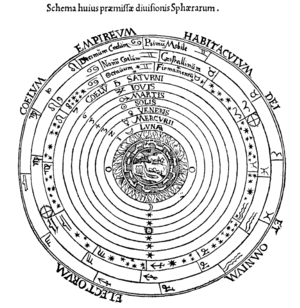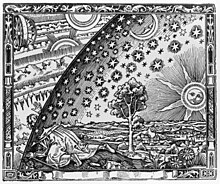Cosmos: Difference between revisions
Tags: Mobile edit Mobile web edit |
|||
| Line 37: | Line 37: | ||
* [[Frank J. Tipler#The Omega Point|Omega point (Tipler)]] |
* [[Frank J. Tipler#The Omega Point|Omega point (Tipler)]] |
||
* [[Omniverse (disambiguation)]] |
* [[Omniverse (disambiguation)]] |
||
* [[Cosmos]] escorted touring under [[Group Voyagers]] |
|||
== References == |
== References == |
||
Revision as of 21:44, 6 January 2015
This article includes a list of general references, but it lacks sufficient corresponding inline citations. (April 2009) |

The cosmos /ˈkɒzmɒs/ is a complex and orderly system, such as our Universe; the opposite of Chaos. It is the Universe regarded as an ordered system.[1] The philosopher Pythagoras is regarded as the first person to apply the term cosmos (Ancient Greek: κόσμος) to the order of the Universe.[2]
Cosmology

Cosmology is the study of the cosmos in several of the above meanings, depending on context. All cosmologies have in common an attempt to understand the implicit order within the whole of being. In this way, most religions and philosophical systems have a cosmology.
In physical cosmology, the term cosmos is often used in a technical way, referring to a particular spacetime continuum within the (postulated) multiverse. Our particular cosmos, the observable universe, is generally capitalized as the Cosmos.
Theology
In theology, the cosmos is the created heavenly bodies (sun, moon, planets, and "fixed stars"), not including the creator. In Christian theology, the word is also used synonymously with aion[3] to refer to "worldly life" or "this world" as opposed to the afterlife or World to Come. The cosmos as originated by Pythagoras is parallel to the Zoroastrian term aša, the concept of a divine order, or divinely ordered creation.[citation needed]
See also
- Cosmic Logos
- Cosmic View
- Cosmic Zoom
- Russian cosmism
- Cosmicism
- Cosmogony
- Cosmogram
- Cosmography
- Carl Sagan and his published works "Cosmos"
- Cosmos: A Personal Voyage (Carl Sagan's television documentary series)
- Cosmos: A Spacetime Odyssey
- Macrocosm and microcosm
- Megaverse (disambiguation)
- Omega point (de Chardin)
- Omega point (Tipler)
- Omniverse (disambiguation)
- Cosmos escorted touring under Group Voyagers
References
- ^ Definition in Merriam-Webster dictionary
- ^ von Humboldt, Alexander (1860). Cosmos: a sketch of a physical description of the universe. Vol. 1. New York: Harper & Brothers. p. 69.
{{cite book}}: Unknown parameter|coauthors=ignored (|author=suggested) (help) - ^ "Concerning Aion and Aionios". Saviour of All Fellowship. Retrieved 22 April 2014.
External links
- Cosmos – an Illustrated Dimensional Journey from microcosmos to macrocosmos – from Digital Nature Agency
- JPL Spitzer telescope photos of macrocosmos
- Macrocosm and Microcosm, in Dictionary of the History of Ideas
- Encyclopedia of Cosmos This is in Japanese.
- Cosmos – Illustrated Encyclopedia of Cosmos and Cosmic Law Template:Ref-ru
- Greene, B. (1999). The Elegant Universe: Superstrings, Hidden Dimensions, and the Quest for the Ultimate Theory. W.W. Norton, New York
- Hawking, S. W. (2001). The Universe in a Nutshell. Bantam Book.
- Yulsman, T. (2003). Origins: The Quest for our Cosmic Roots. Institute of Physics Publishing, London.
